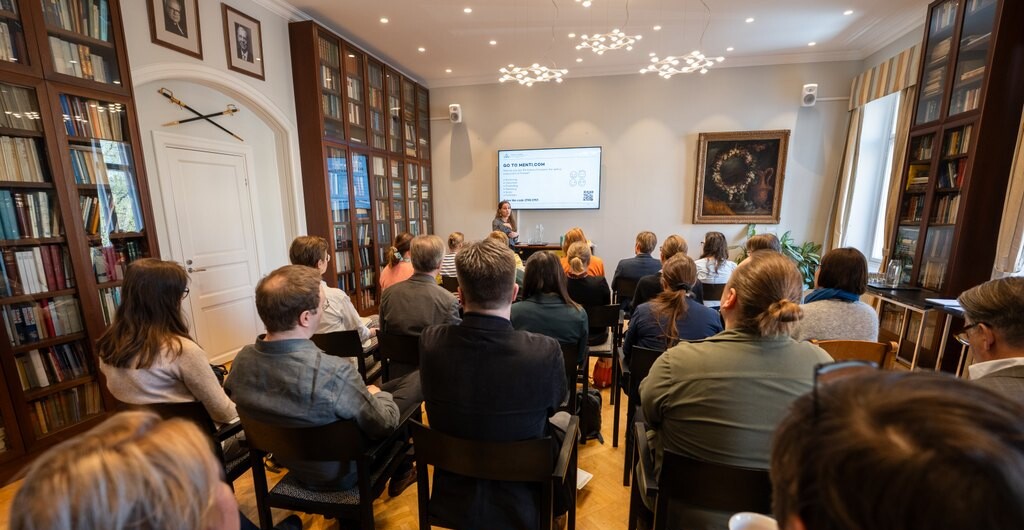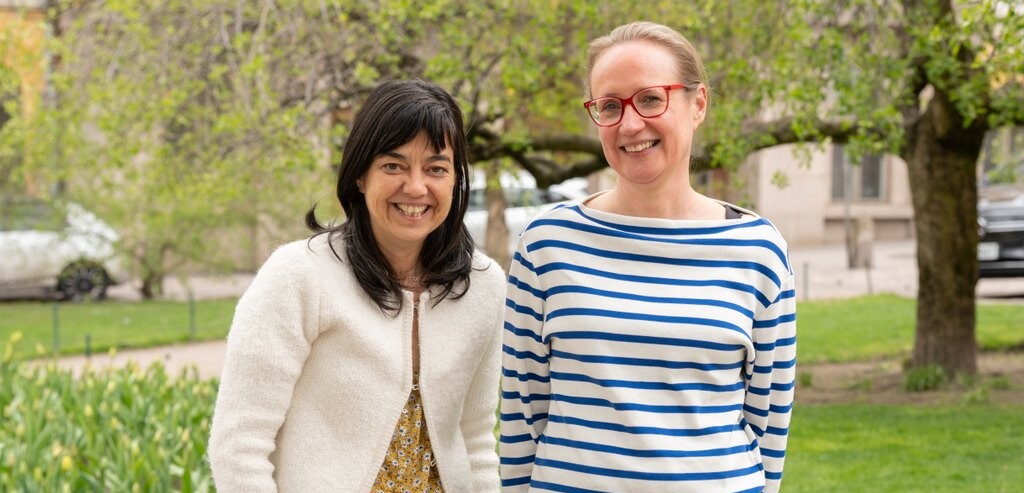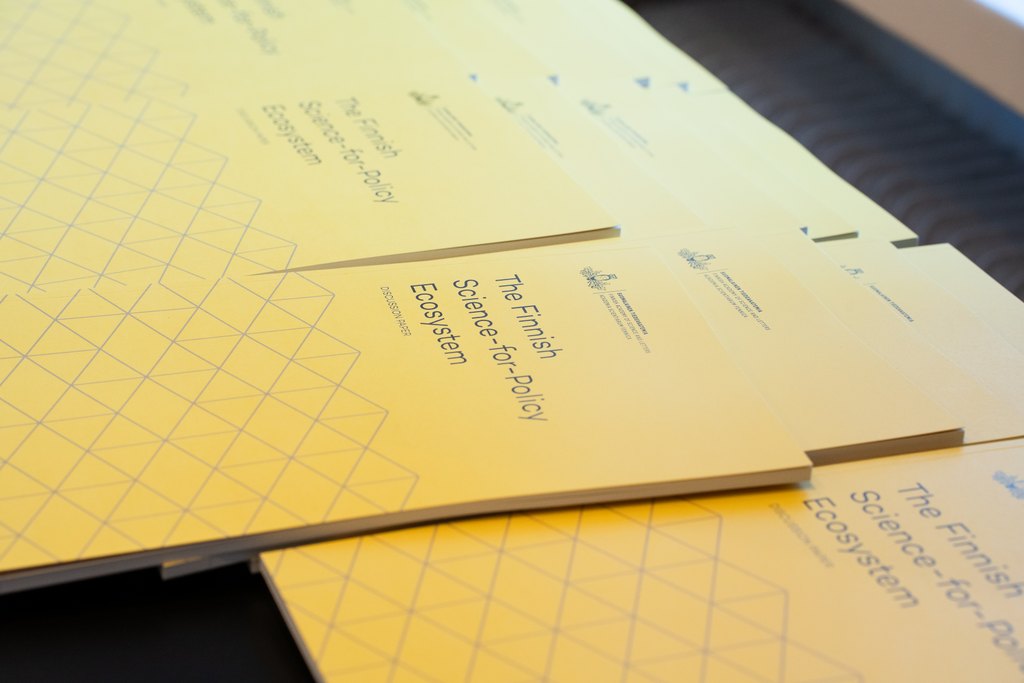The Finnish Academy of Science and Letters published a discussion paper in May 2025 on the ecosystem of Finland’s evidence-informed policymaking. The publication includes three proposals for its development: 1) strengthening knowledge brokering expertise in different organisations, 2) developing science advocacy towards a more collaborative and phenomenon-based direction, and 3) strengthening the structures of evidence-informed policymaking and comprehensively reforming them.
Science-policy interface refers in the paper to social processes that involve relationships between researchers and other actors in policymaking, enabling exchanges, co-evolution, and the joint construction of knowledge with the goal of improving societal decision-making. The paper published by the Finnish Academy of Science and Letters describes Finland’s science-for-policy ecosystem as a decentralised network of actors, where the transfer of research knowledge to decision-making still relies mainly on traditional reactive and one-way science communication instead of continuous collaboration. In some other EU countries, there are coordinating structures for scientific collaboration as part of central government operations, such as the government science advisor positions in the United Kingdom.
The future looks promising but uncertain
To initiate broader societal discussions about the future of science-policy interactions in Finland, the Finnish Academy of Science and Letters organised two discussion events in May 2025.
The first workshop and paper publication event was held on May 7, 2025, in collaboration with the European Commission’s Joint Research Centre, focusing on both Finland’s situation and examples from other European countries on promoting science-policy interaction. International perspectives on the topic were also provided in presentations from the UCL Knowledge Broker Academy and the Universities Policy Engagement Network UPEN.
The participants of the event, representing universities, boundary organisations, science panels, the Research Council of Finland, and various ministries, assessed through a voting survey that the future of Finnish evidence-informed policymaking is promising but uncertain.
The second discussion took place on May 22 with influential Finnish officials, and they emphasized the importance of even bold reforms.

The European Commission aims to strengthen science-policy interaction across Europe
The Joint Research Centre (JRC) of the European Commission has initiated work aiming at strengthening evidence-informed policymaking structures across Europe. The JRC acts as the coordinator and inspirator of a multi-country project, seeking to support national-level development in EU member states and bringing together actors from different countries to learn from each other. The Joint Research Centre’s experts Anne-Greet Keizer and Filipa Vala stated at the publication event that the EU-level work originated from the COVID-19 crisis, when it was necessary to act quickly and collaboratively in support of decision-making.
”During COVID-19 it became clear to everybody – not just to policymakers and scientists but also to citizens – that we need evidence to make good policies and to solve societal problems. But now, in the post-pandemic Europe, this is not always obvious to everyone. We see the need for a better narrative to demonstrate the importance of evidence-informed policymaking”, says Anne-Greet Keizer, policy analyst at the JCR.
”Evidence, trust, and democracy – that is the nexus of the three main ideas that are the goals of the European Commission. The goal is to give visibility to political decision-making processes so that the citizens know how decisions are made”, adds Filipa Vala, JRC’s policy analyst.
At a practical level, one of the JRC’s goal is also to establish a European network of professionals working in knowledge brokering. This community of practice would organise, for example, webinars, professional development sessions and other events. Much can be learned from other countries, but what works in one country is not necessarily applicable in other contexts.
”This community can bring together the people that are working on knowledge brokering activities, whether it is in a ministry, research institution or in a dedicated knowledge brokering organisation. They need an infrastructure to communicate with their peers and to share best practises”, Anne-Greet Keizer says.

On the European Commission’s future agenda is to consider: 1) how knowledge brokering becomes a recognised profession, 2) how to combine and value different types of knowledge, 3) how to utilise artificial intelligence in a sensible way, and 4) how to measure the impact of science for policy. Showing the societal impact of research is not always straightforward, but good examples can be found in many countries:
”Science can help in solving trade-offs in policy or come up with solutions that alleviate negative effects. For example, in Portugal we had to choose between birds or installing wind farms. Based on scientific advice radar systems were installed that detect incoming bird flocks, and stop the wind farms from working when birds are on the migratory path”, explains Filipa Vala.
”Governments often bases policies on the idea that if we just inform people what to do, they will do it. In the Netherlands, an advisory report made a difference by introducing a new approach to overall policy-making based on behavioural sciences: citizens’ capacity to act particularly when facing difficult life events. One of the outcomes was that the Dutch government designed a website that gathers tangible advice on what to do when facing different life events, such as losing a job, and makes it easier for the people to act accordingly”, says Anne-Greet Keizer.
Roadmap toward more a solid science-for-policy ecosystem?
The strengths of the Finnish science-for-policy ecosystem are openness, social trust, low hierarchies, and good informal networks based on relationships between individuals. Despite these strengths, the effectiveness of the science-policy interaction is hampered by the dominance of the one-way communication, and use of scientific knowledge only at the late stages of political decision-making. In the discussions at the Finnish Academy of Science and Letters events, it was noted that Finland has built its evidence-informed policymaking system for a long-time, including in the building of the welfare society. Therefore, evidence-informed policymaking is not a new thing. Yet, in recent years it has received a limited amount of public attention in Finland.
In the discussions, it was noted that evidence-informed policymaking in Finland needs long-term structures that are not dependent on shifting political priorities. What would be a suitable model for Finnish society and the coordinating unit: the Prime Minister’s Office, a consortium of research institutes, or a knowledge brokering organisation? One suggestion in the discussions was also to create a roadmap for evidence-informed policymaking with goals and measures to support the strategic RDI activities.
Read more: Summary of the group discussions 7 May 2025
Photos: Aleksi Kylmälahti

